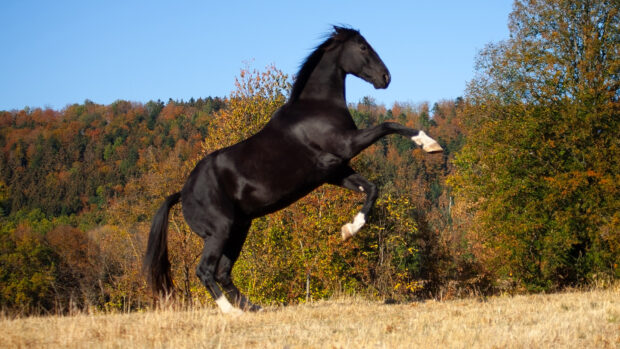REFORM of equine identification in England has reached a “watershed moment” – but the industry must support the system for it to work.
Defra has published the outcome and its response to its consultation on equine traceability and ID, the aim of which was to seek views on its plans to improve the system.
New legislation is expected to be introduced, but all the indicators are that it will be a digital-first system, which campaigners have welcomed as the way forward.
In the past, UK horses had vaccination certificates, and separate pedigree documents. To comply with EU law, these were brought together in passports, and a number of passport-issuing organisations (PIOs) were set up. The horsemeat scandal of 2013 made the UK Government “sit up and take notice” of problems in the system, British Horse Council (BHC) chairman David Mountford told H&H, but under EU laws, it was not possible to make the changes needed to address this country’s unique issues.
“We’ve been saying for years that for an equine ID system to work, it needs to be frictionless to the end user,” Mr Mountford said. “It needs to be easy to deal with, and there needs to be some carrot and some stick. We feel it’s been lacking both carrot and stick as it’s not enforced, and people feel there’s no benefit to putting in administrative and financial effort, and no penalty for not doing it.
“We’ve been banging on and the Government has always said ‘we’re in the EU so we can’t do anything’ but having come out, and acknowledged the system is a complete Horlicks, the Government had no excuse to do nothing.”
Defra’s consultation launched this spring, after an Environment, Food and Rural Affairs select committee report into moving animals across borders post-Brexit condemned Britain’s “not fit for purpose” equine identification system. Almost 400 people and organisations responded, and more than 3,400 to a BHC survey run at the same time, with Defra’s support, and designed to be easier to understand.
There was strong support for a digital-led system; respondents felt the process of updating passports by returning them to PIOs was costly, time-consuming and inefficient, and that a paper document-based system is open to fraud. Many were not aware they had to keep passport details updated.
Mr Mountford said the council had thought more people might want to keep the status quo.
“But respondents were very broad-minded about understanding that it is the way forward,” BHC director Jan Rogers told H&H. “There were some reservations – people are attached to paper passports and the status quo – but one statistic was that 87% of people feared paper passports’ being lost in the post.”
Benefits of a digital-first system, with horses’ and owners’ details stored on the Central Equine Database (CED) include traceability – if horses are lost or stolen, this can be flagged on the system immediately, for example – and disease control. If there was an exotic disease incursion, or a flu epidemic, and a horse was at risk, its owner could be notified. Benefits to welfare include the fact owners will be accountable for their animals. There may well also be future benefits that help smooth the passage of horses across borders, such as uploading proof of vaccinations and health checks to the CED before travel, so horses do not have to wait at borders to be checked, or returned home if the paperwork is incorrect.
“The survey respondents and the BHC see the importance of paper documents to evidence pedigree, and that they will be needed for the time being to cross borders,” Mr Mountford said. “This does not prevent a digital record being the primary form of equine ID. Digital is the way forward and if we can lead with a digital system, others will follow.
“It’s a no-brainer but someone’s got to take the first step and it would be nice if that was the UK.”
One issue long raised is that there is little effective enforcement of the current system.
“People are less likely to comply if there are no consequences,” Ms Rogers said, adding that a central system means more opportunity for checking, and issuing fines for non-compliance, which will build confidence in the system.
But also, if there is perceived extra value to a horse that is properly registered, and if it is cheap and easy to be compliant, there is more chance more horses’ details will be uploaded.
“This is a watershed moment,” Ms Rogers said. “If this happens, so many other things will happen because of it.”
Mr Mountford added that although legislative changes take time, there are actions the Government can take without changing the law, more quickly. He said the BHC and Defra have a good working relationship, and that the former will be “holding their feet to the fire to make sure they make things better”.
“But we need the industry to be supportive,” he said. “The Government can put the legislation in place but the industry needs to make sure the system works by supporting it.”
A Defra spokesman told H&H the consultation response indicates the policy direction for improvements to equine identification and traceability in England, “including increased digitisation of the system so it’s easier for owners to access and record details of equines”.
“We will continue to engage with industry on developing the policy proposals, as indicated in the report, including digital identification for equines, whilst retaining paper passports for those that will require them for zootechnical or international travel purposes,” he said.
“Some of the changes will require new legislation, which is expected to be implemented in 2023. Changes will better prioritise equine health and welfare, whilst supporting stronger traceability in the case of equine welfare concerns or disease outbreaks.”
You might also be interested in:

Your chance for your voice to be heard — in one chance to get it right on equine ID

Defra light on promises after equine ID system found to be ‘not fit for purpose’

Subscribe to Horse & Hound magazine today – and enjoy unlimited website access all year round
Horse & Hound magazine, out every Thursday, is packed with all the latest news and reports, as well as interviews, specials, nostalgia, vet and training advice. Find how you can enjoy the magazine delivered to your door every week, plus options to upgrade your subscription to access our online service that brings you breaking news and reports as well as other benefits.




